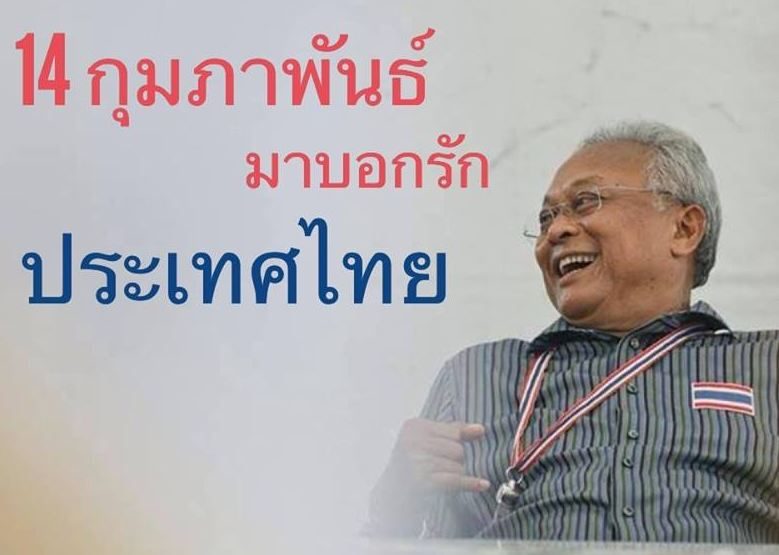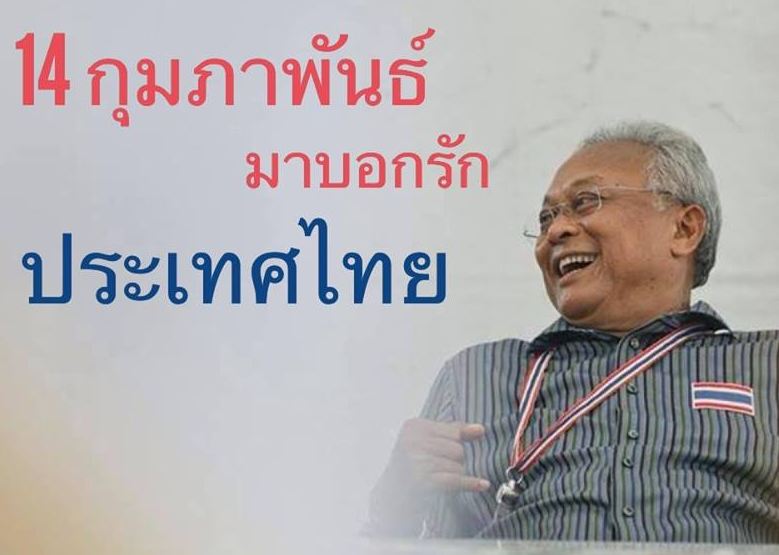Suthep Thaugsuban talks a lot about establishing a people’s council, led by a “neutral” prime minister who is also a “khondee” (good person คนดี). His utopian government and ideal prime minister must be untarnished by the nastiness of politics, but filled with sincerest dedication to help Thailand and its people move “forward.” I doubt if this “khondee” person actually exists in Thailand, but I was told by a Blue Sky channel audience that if I spare some of my time and listen to Suthep’s daily speeches, tune in to watch programmes on Blue Sky Channel, or talk to people who have been attending the whistle blower protest rally, I will believe that this “khondee” person actually exists. And that one day destiny will let us meet this “khondee” person and he will rescue us all from the atrocities of the Thaksin regime.
Although Thai political conflicts have regularly been dramatised in the news, after hours of listening to Suthep I realised that he talks about Thai politics like he is narrating a romantic Thai soap opera or Thai lakorn. I can only assume this is one of the reasons some people feel emotionally involved when watching Blue Sky Channel and listening Suthep. If you are not familiar with Thai lakorn (ละครไทย), just remember there are only four important characters you need to know: the male lead/hero (pra-ek, พระเอก), the female lead/heroine (nang-ek, นางเอก), the male villain (tua kong/tong rai, ตัวโกง/ต้วร้าย), and the female villain (nang rai/nang icha นางร้าย/นางอิจฉา). In some lakorn the male villain and the female villain are brother and sister (I guess evil runs in the family). The plot of most Thai lakorn is a romantic tale of boy meets girl, rescue girl from evil, resolve conflicts, and in the end boy marries girl and they live happily ever after. It is surprising how the narrative of Suthep’s speeches to is so similar to the narrative conventions of Thai lakorn.
And here’s how Suthep’s version of romantic lakorn goes:
First there is a heroine or nang-ek of the lakorn, who is a pure, kind, and innocent young women, whose beauty is unmatched by any other women in this world. Apart from her overly attractive face, she is also famously known for her beautiful smile. Her family used to be very wealthy in the past, but more than 10 years ago, a large part of her family’s wealth was stolen by the villain.
The villain of this lakorn is a man from a faraway land in the north. Not only is the villain an ugly man, he is also very greedy. His evil heart always long for more power and money. He exudes evil wherever he goes. Whatever he does, he does it with bad intention. The villain always has hidden agenda behind everything he does, usually for the benefit of himself. He is the villain of the villain, worse than any other evil characters combined.
He has been taking advantage of the heroine for many years and wants to gain even more from her. But due to unfortunate circumstances, he is currently residing in a faraway land. However his ghost still haunts the heroine, because he sends his sister, the female villain to take his place and mess with the lovely heroine. The female villain of this lakorn is as evil as her villain brother. Although the villain sister is a beautiful, she is manipulative and very greedy. Since the villains are strongly supported by the evil police, the poor heroine is too weak and too innocent to fight against the villain brother and sister by herself. All she can do is to wait for is her knight in shining armor, the hero or pra-ek to slay the villains and rescue her.
The hero of this lakorn is a good man and of course he is very handsome. Some says his heart is as handsome as his face. He is an ideal man from an upper class background, who is well-heeled with good education and social status. He is not greedy for the heroine’s wealth because he already has enough wealth of his own. His elite status allows him to appreciate fine culture and behave with class and dignity. He speaks English with a perfect British accent, unlike the villain who cannot even speak Thai properly. He is also very kind and has empathy for the poor. He is the epitome of goodness, overflowing with a sense of morals and ethics. Unlike the villain, the hero does everything with good intentions and out of the good of his heart. As a devoted Buddhist, with religion on his side, he uses peaceful approach to fight the villains, without weapons (unless necessary). His best weapon is his words, in which he use to dehumanise the villain, but it is alright since the villains do not deserve to be human anyway. Whatever he does for the sake of destroying the villains are justified.
The hero persuades the heroine to believe that he is the only one who can help her, because he is a hero and a good man. The hero can do anything, because he is a hero. He is exempted from all criticisms because everything he does, he does it to rescue the heroine from the villains. He can even use the heroine as a hostage during the fight with the villains, but it is still alright because he is a hero. No matter how violent or illogical his actions seem to be, they are acceptable and justified because he is a hero who has to do whatever it takes to take down the villains.
This lakorn is full of violence and bloody scenes, often shown to evoke the audience’s emotions and to emphasise how evil the villains are. Sometimes, along the way, the heroine might start to lose faith in the hero, but another victim of the villains makes an appearance just in time. This is an opportunity for the hero to reassure the heroine how evil the villains are and how good a person he is by comparison. His empathy and generous donations for the victims who fall prey to the villains only make the hero shine even more righteously than before. Once again the heroine restores all of her trust and complete faith in the hero.
This romantic lakorn continues until further developments…
The majority of Thai lakorn end with a scene where the hero has successfully destroyed the villain, reunites with the heroine, and they live happily ever after. Thus it is no surprise that some Thai people expect something similar to happen in reality. The narrative of Suthep’s speeches reassures his audience to expect no less to happen with the current political conflict, when “khondee” becomes a prime minister, resolves all the conflicts, eradicates the Thaksin regime, and restores Thailand’s peace.
But maybe Suthep has forgotten that in reality there is no such thing as an ending as in the lakorn. In reality, even when the villain is killed, and the hero and heroine live on, we should still ask ourselves these questions: Can the hero and heroine really get along? Can hero really help the heroine solve her problems like she expects him to? Will their life together really be a blessed with prosperity and peace? In the absence of a villain, is the goodness of the hero still visible? Or could it be possible that the hero will eventually turn out to be just another villain hidden behind the mask of a hero?
Suthep’s strategy has not progressed far from where it started a few months ago because he cannot do anything more than narrating the romantic lakorn and encouraging false anticipation for this constructed ideal of a hero. And he is probably too afraid to wake people up from a dream where a hero comes to rescue and all will be well at the end because people might be greatly disappointed if what they initially thought of as a romantic tale turns out to be a tragic tale where the heroine got killed by both the villain and someone who called himself a hero.
PS. Fantasising about a hero who will come and rescue is an easy way out since it requires very little effort to just wait. Even if the romantic narrative does not work out in the end, one might expect a ghost plot line to come next. Judging by how much ghosts are used in Thai televisions and cinemas, it is only a matter of time before protest leaders talk about relying on the power of the holy ghosts to restore peace back to the country. Oh wait, have they done so already?
PPS. Suthep said in his speech on 13 February 2014 that on Valentine’s Day there will be a public love confession at his ‘I love you Thailand event.’ What could be more romantic than hearing a hero proclaiming his love to the heroine on the most romantic day of the year:
…We love you Thailand. We are the owner of Thailand. Thailand belong to us. Thailand is not a property of the villains’ family. Thailand belong to us all. And we will fight for our Thailand. Our fight against the villains is for the sake of our Thailand. After our love confession to Thailand. Let’s also break up with the villains for good because their existence are damaging to Thailand. The villains should just go way…
Merisa Skulsuthavong is a PhD candidate in the School of Journalism, Media and Cultural Studies at Cardiff University.
 Facebook
Facebook  Twitter
Twitter  Soundcloud
Soundcloud  Youtube
Youtube  Rss
Rss 
